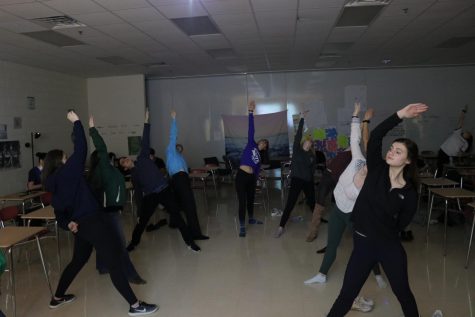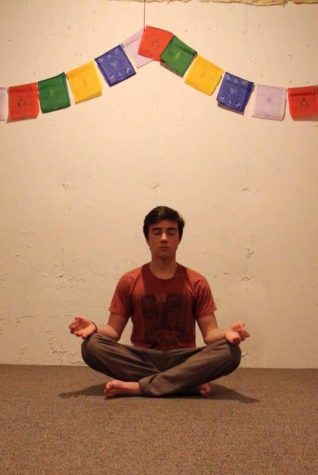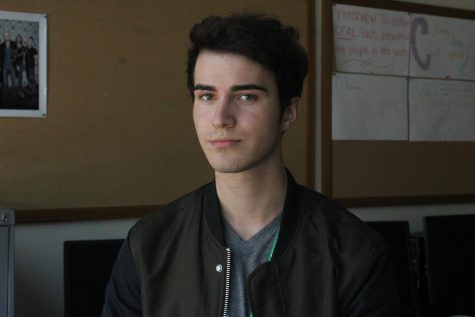Mindfulness: The science and spirit behind a new path to living
It’s no longer reserved for heavy practitioners in the eastern hemisphere. It’s not something being preached by a Woodstock Baby Boomer. Mindfulness, as a matter of fact, is growing into a popular method for managing stress, anxiety, and depression. Students and teachers, young kids and elders, every generation is beginning to learn more about how this easy practice can change your life. As the second semester narrows down, students may find themselves in a hole that can seem impossible to climb out of. Some York teachers, though, have found some solutions to help keep them motivated throughout this time.
“I find it [yoga] to be beneficial for students because you guys have a lot of pressure on you! I look at my students and they practically wear stress on themselves,” said Jessica Noble, English teacher and sponsor of yoga club. “It’s hard to see the obsessions we see with PowerSchool and the obsessions to do well, get into the best schools, have the highest ACT/SAT score and this constant competition… that can really wear on a person’s ability to be happy.”

English teacher and yoga club sponsor Jessica Noble leads her AP research class with a short yoga session at the beginning of class. Fri., Jan. 19, 2018
Noble teaches AP Research, a rigorous course for students who look to improve their research and writing skills. The class, like most classes at York, can sometimes be draining to a student if they’re sleep deprived, stressed, or mentally exhausted. By leading her class in a five minute yoga session at the beginning of each class, it’s a beneficial kick-start to the class that gives the students the jolt of energy they need to get through the day.

Noble’s AP research class follows her lead in their yoga session to help them stay motivated throughout the day. Fri., Jan 19, 2018
“There’s a yogic saying, chitta vritti, which means ‘mind chatter’ or “monkey brain,” Noble said. “I think in our Western culture in America, we’re a very fast paced society. We look at the rise in heart disease and anxiety and depression, and you have to think of the correlation between how we live and how so many people like mindfulness.”
While Noble leads her classes with yoga, another English teacher, Andrew Bendelow, allows his classes to put away their screens for the first minute of each class, giving them time to sit and breathe, something they haven’t thought about in the midst of their bustling school days.
“We just ask them to ‘center themselves’, through breath, cross-lateral stretch, or self-talk. We show them methods like ‘The Backpack Meditation’, and the ‘Japanese Five Fingers’ technique. Also, simply focusing on the breath is extremely centering,” Bendelow said.
Through the various breathing methods that can help an individual get in touch with their inner selves, that’s just one more way for how we can guide our lives into a more mindful manner. While these may be methods that teachers have been providing to their students, young people may find it useful to see how someone their own age practices mindfulness their own way. York alum Charlie Rogers (class of 2018), for example, claims how his ongoing vegan diet has supported his mindfulness journey.
“The start of practicing mindfulness for me was when I switched over to a plant-based vegan diet because I finally started to be more conscious on my decision,” Rogers said. “It was also huge, because I was finally being mindful about how my actions impacted the whole world around me in either a positive or negative way”

Senior Charlie Rogers uses meditation, requires practice with deep breathing, to help with his journey in mindfulness.
Veganism: a diet where there are no animal products consumed or even any animal products used for clothing, has become a popular trend in today’s youth, especially among college students. Becoming more conscious about the decisions you make, such as something as simple as watching what you eat, is already a foundation to your mindful self. For Rogers, though, there’s more to the practice other than veganism. He also takes up practicing meditation, which requires extensive watch over one’s breathing.
“I would recommend sitting down in a quiet spot, closing your eyes, and focusing on slow deep breathing”, Rogers said, “There is no right or wrong way to meditate. All you need to do is relax and breathe.
Rogers, who graduated early this school year, explains how his journey supported him throughout his years in education.
“These practices have helped me take responsibility for myself, and when I get stressed out with school or anything else I can focus on my breathing calm myself down,” Rogers said, “It also has given me a broader perspective to realize that learning is important, but what I get on a math test really isn’t important when it comes to living a fulfilling life. This has drastically changed my life from constantly stressed about my GPA to understanding everything will work out.”
One of Rogers’ role models, Wim Hof, also known as “The Iceman”, has engaged in a more extreme form of meditation and mindfulness. Hof has managed to submerge himself in subzero temperature waters, which he attributes to his Wim Hof breathing techniques based on Tibetan Tummo meditation, but without its religious components.
According to Hof’s website www.icemanwimhof.com, “wim is able to hold his breath with ease for over six minutes while his entire body is submerged under water. Cold water, obviously. It’s possible for everyone. The base lies in proper breathing.”

Wim Hof, an “extreme athlete,” who uses Tibetan meditation to inspire his breathing techniques, signifies how it can benefit your body and mind, even if you wish you withstand subzero water temperatures.
Breathing, our routinely process that keeps us alive that we hardly pay attention to, is clearly being noted as a key to helping you practice mindfulness. The fact of the matter is that your awareness of breath is only the foundation for healing your body and mind. While veganism, awareness of your inner-self and meditation can certainly help you on your journey, Deepak Chopra, M.D., coauthor of The Seven Spiritual Laws of Yoga, supports these claims, but looks at the bigger picture of achieving mindfulness.
“When you begin to recognize that your essential nature is unbounded and eternal, life becomes joyful, meaningful, and carefree” Chopra said.
Whether you’re new to yoga and meditation, or maybe hesitant to start a new diet, mindfulness, according to students, teachers, athletes and doctors, enables you to see your environment, body, mind, and emotions from a new perspective.
In the words of Marcel Proust, he writes, “The real journey of discovery is not in seeking new landscapes, but in seeing with new eyes.”

Nate Swanson is a senior at York, and this is his first year on staff. He's also a part of Mirrors Magazine and Fine Arts Week Committee. When he's not...









